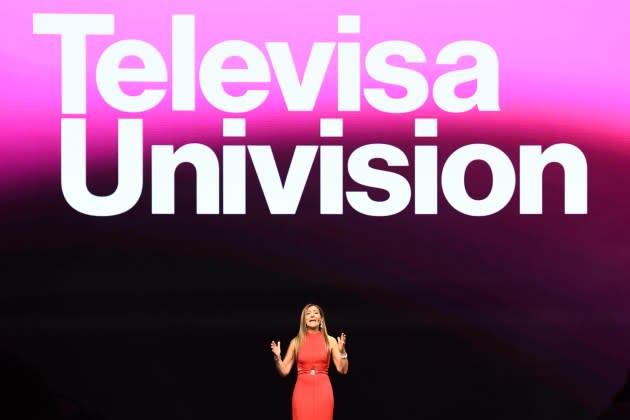TelevisaUnivision CEO Wade Davis Says SAG-AFTRA And WGA Strikes Have “Zero Impact” On Company Due To Non-U.S. Programming Supply; Upfront Is Tracking “Well Above” Peers

TelevisaUnivision CEO Wade Davis said the dual strikes crippling Hollywood have “zero impact” on his company’s operations due to the Hispanic media giant’s programming supply chain.
“The first thing I would say is that I’m sad to see the conflict,” Davis said on the privately held company’s second quarter earnings call. “We hope that this gets resolved favorably and quickly for all the parties involved. That said, it has zero impact on us. Nearly 100% of our production is outside the U.S. Nearly 100% of our content is original and produced by our content engine, which is vertically integrated. In Q2 alone, we produced 24,000 hours of content across original entertainment, news and sports. And the only real unionization we have in our infrastructure is the unionization of the physical production labor.”
More from Deadline
Prior to leading the acquisition of Univision and spearheading its $4.8 billion merger with the entertainment division of Grupo Televisa in 2022, Davis spent 12 years as a senior exec at Viacom. His experience at the MTV and Nickelodeon parent immersed him in media advertising, and on the call he argued that TelevisaUnivision’s non-U.S. structure not only insulates it from labor strife but also gives it advantages in the upfront ad market. Along with the flagship Univision broadcast network, the company operates dozens of local TV and radio stations in the U.S. as well as streaming service Vix.
“For our advertisers in the upfront, this means a lot because they know there’s not going to be any disruption to the full slate of original content we have every night of the week, 365 days a year,” Davis said. “On the other hand, the uncertainty in the general market really creates a lot of challenges for advertisers in the upfront, who are being asked to make forward advertising commitments for a broadcast year without the certainty of knowing what that content slate is going to look like over the course of the year. Some of those differences contributed to why we have seen such good results in the upfront and expect to close the upfront well above the rest of the market.”
Total revenue in the quarter grew 11% to $1.2 billion, with foreign currency exchange rates providing a tailwind. Total advertising revenue grew 10%, but in the U.S. it inched up just 1% to $452.6 million. Adjusted operating income before depreciation and amortization stayed flat at $373.9 million.
The company touted its ability to keep profits even even compared with a year ago despite investing more than $800 million in Vix, which launched under its current name and ownership in 2022. Streaming viewing hours on Vix grew 17% over the prior quarter, the company said. Total investments in Vix, including new original programming, sports rights, marketing and technology, increased 17% over the year-ago period to $846 million.
Davis said initial data from the upfront process suggest that Univision is poised to take “meaningful share” from English-language broadcast nets. “In addition, we expect to fare better than the market on price.” Volume will be up mid-single-digits, he projected, “an incredible accomplishment in a broader market expected to be down.”
Best of Deadline
Sign up for Deadline's Newsletter. For the latest news, follow us on Facebook, Twitter, and Instagram.

